MEET THE CROWS
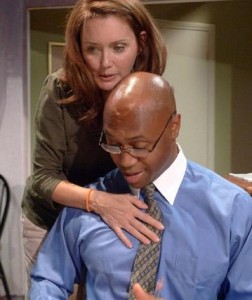 Neighbors is a mess, but it is the most vibrant and ground-breaking mess you are likely to encounter in any theater in Los Angeles at the moment and I apologize for being delinquent in getting this review out because it has come to my attention that Neighbors is offering all sorts of ticket deals, which means, of course, that it is in need of audiences. Run, I say, don’t walk, and hie thee to the Matrix Theatre if you’re at all interested in seeing the work of a most adventurous young American playwright at the beginning of what is almost sure to be a brilliant career. His name is Branden Jacobs-Jenkins and his play, Neighbors, is perverse, scabrous, provocative, ugly, politically dangerous, complex, intense, maddening, infuriating, savagely ironic, hilariously funny, continuously surprising, and as innovative and transforming as an act of magic. Now you are seeing one thing. Now you are seeing another. You may stagger out of the theater, not sure what you have seen. But you will know at least that you have had an experience that will stick to you and keep its hold on you long after less messy theater experiences have faded from memory.
Neighbors is a mess, but it is the most vibrant and ground-breaking mess you are likely to encounter in any theater in Los Angeles at the moment and I apologize for being delinquent in getting this review out because it has come to my attention that Neighbors is offering all sorts of ticket deals, which means, of course, that it is in need of audiences. Run, I say, don’t walk, and hie thee to the Matrix Theatre if you’re at all interested in seeing the work of a most adventurous young American playwright at the beginning of what is almost sure to be a brilliant career. His name is Branden Jacobs-Jenkins and his play, Neighbors, is perverse, scabrous, provocative, ugly, politically dangerous, complex, intense, maddening, infuriating, savagely ironic, hilariously funny, continuously surprising, and as innovative and transforming as an act of magic. Now you are seeing one thing. Now you are seeing another. You may stagger out of the theater, not sure what you have seen. But you will know at least that you have had an experience that will stick to you and keep its hold on you long after less messy theater experiences have faded from memory.
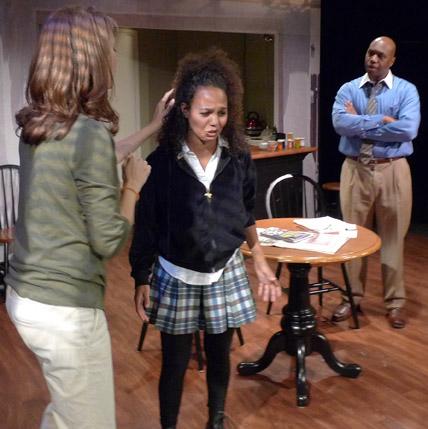 On one side of the stage live the Pattersons, in their suburban paradise, protected by a picket fence that keeps out of their range of vision anything that might disturb the orderly lives they have created for themselves and which they have maintained for years. He is black and an academic; his wife is white; their daughter is a pretty, educated, and painfully bored young woman decidedly of mixed-race. The world in which they have chosen to live is basically middle-class and most certainly white. Only the daughter seems to be at odds with this way of life. At least, on the surface.
On one side of the stage live the Pattersons, in their suburban paradise, protected by a picket fence that keeps out of their range of vision anything that might disturb the orderly lives they have created for themselves and which they have maintained for years. He is black and an academic; his wife is white; their daughter is a pretty, educated, and painfully bored young woman decidedly of mixed-race. The world in which they have chosen to live is basically middle-class and most certainly white. Only the daughter seems to be at odds with this way of life. At least, on the surface.
And on the other side of the stage, here come the new next-door neighbors, and guess who has moved in? It’s the Crows, a family of minstrel performers which includes Mammy and her children Sambo, Topsy, Zip and Jim. Jim? Well, he hasn’t quite settled into the stereotype the rest of his family embraces. He’s been asked to replace his late father in the minstrel show, but, although he’s got the rhythm, he’s not altogether comfortable with the idea. So naturally he and Melody Patterson, both a little on the outside of things, are attracted to each other.
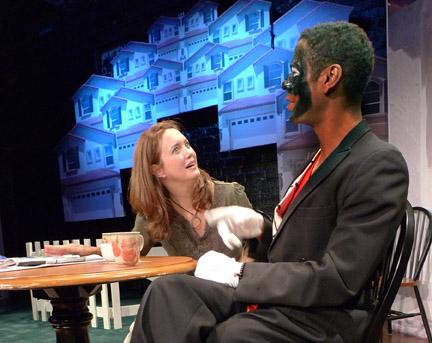 Richard Patterson, who has long ago abandoned his natural roots, becomes more and more unhinged by the outrageous behavior of his minstrel neighbors. Slowly but surely all sorts of questions arise. Whose attitudes are truer to being really black? The Crows in their racial mimicry? The Pattersons in their refusal to recognize some truth they have been avoiding? Is Richard’s wife, Jean, who has never thought of her husband as “black,” really attracted to black men? A deep-seated discontentment with her life begins to emerge. She not only finds her new neighbor, Zip, friendly and helpful, but an escape from the more and more oppressive relationship with her husband and, ultimately, a man she is truly attracted to but also able to find solace with. Are Jim and Melody the new world that will emerge? And behind the minstrel act they have perfected and played to a world they have amused for so long, aren’t the Crows only too aware of the roles they are playing? How long can they maintain these embarrassingly demeaning roles?
Richard Patterson, who has long ago abandoned his natural roots, becomes more and more unhinged by the outrageous behavior of his minstrel neighbors. Slowly but surely all sorts of questions arise. Whose attitudes are truer to being really black? The Crows in their racial mimicry? The Pattersons in their refusal to recognize some truth they have been avoiding? Is Richard’s wife, Jean, who has never thought of her husband as “black,” really attracted to black men? A deep-seated discontentment with her life begins to emerge. She not only finds her new neighbor, Zip, friendly and helpful, but an escape from the more and more oppressive relationship with her husband and, ultimately, a man she is truly attracted to but also able to find solace with. Are Jim and Melody the new world that will emerge? And behind the minstrel act they have perfected and played to a world they have amused for so long, aren’t the Crows only too aware of the roles they are playing? How long can they maintain these embarrassingly demeaning roles?
All these different layers of meaning may prove too unwieldy for one play, but they certainly resonate profoundly, and when the audience is confronted with its own complicity in the madness they are watching, the moment is sublime. Jacobs-Jenkins has beautifully written the human plight of the Pattersons – it is a play unto itseslf – but his real triumph is to constantly overlap this drama with his outlandish, possibly offensive picture of the Crows. But what he is 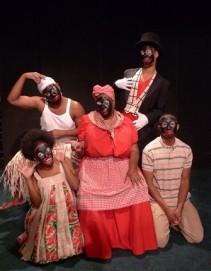 really asking of his audience is that they spend sleepless nights coming up with answers to the conundrums he poses. Isn’t that one of the things theater is really all about? Especially when the conundrums are eminently worth posing?
really asking of his audience is that they spend sleepless nights coming up with answers to the conundrums he poses. Isn’t that one of the things theater is really all about? Especially when the conundrums are eminently worth posing?
Yes, the play goes on too long and, yes, the part of Richard Patterson is not as fully realized by Derek Webster as it should be and, yes, Nataki Garrett’s direction is sometimes dazzling and sometimes given to fits and starts and, yes, the configuration of the Matrix’s Cinemascope stage obscures some action that should be better focused; but there are performances you are likely never to forget – Daniele Watts playing every racial stereotype from Josephine Baker to Diana Ross in a mesmerizing display of hilarious character assassination, Julia Campbell’s heart-breaking delineation of Jean as a woman unraveling before her own eyes and in her own mind, Leith Burke’s insinuating and oddly gentle Zip, Baadja-Lyne’s outrageous salt-and-pepper shaker of a Mammy come to life – and, in general, Neighbors is essential if anything these days is essential.
photos by I.C. Rapoport
Neighbors
Matrix Theatre in Los Angeles
ends on October 24, 2010
for tickets, visit the Matrix Theatre
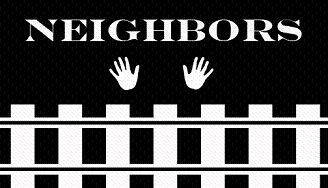

{ 1 comment… read it below or add one }
Here we are stuck in London, and your review makes me want to fly to L.A. to see this marvelous-sounding play.